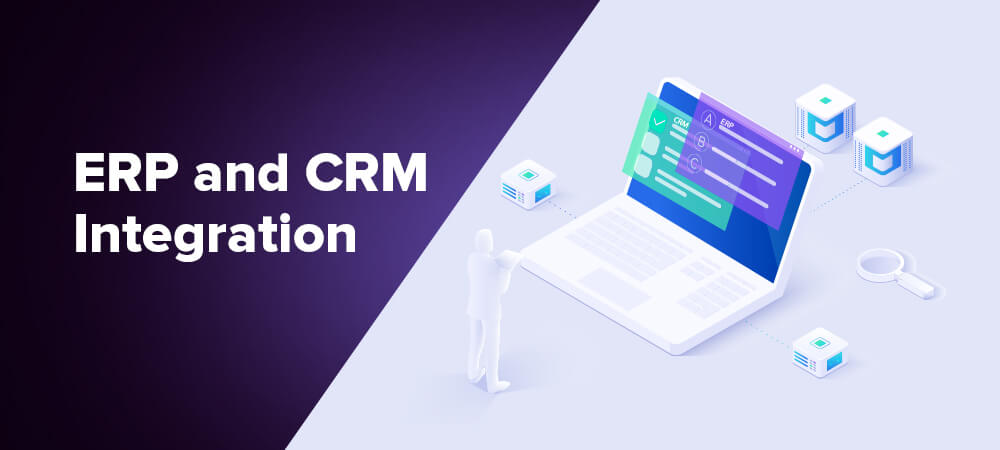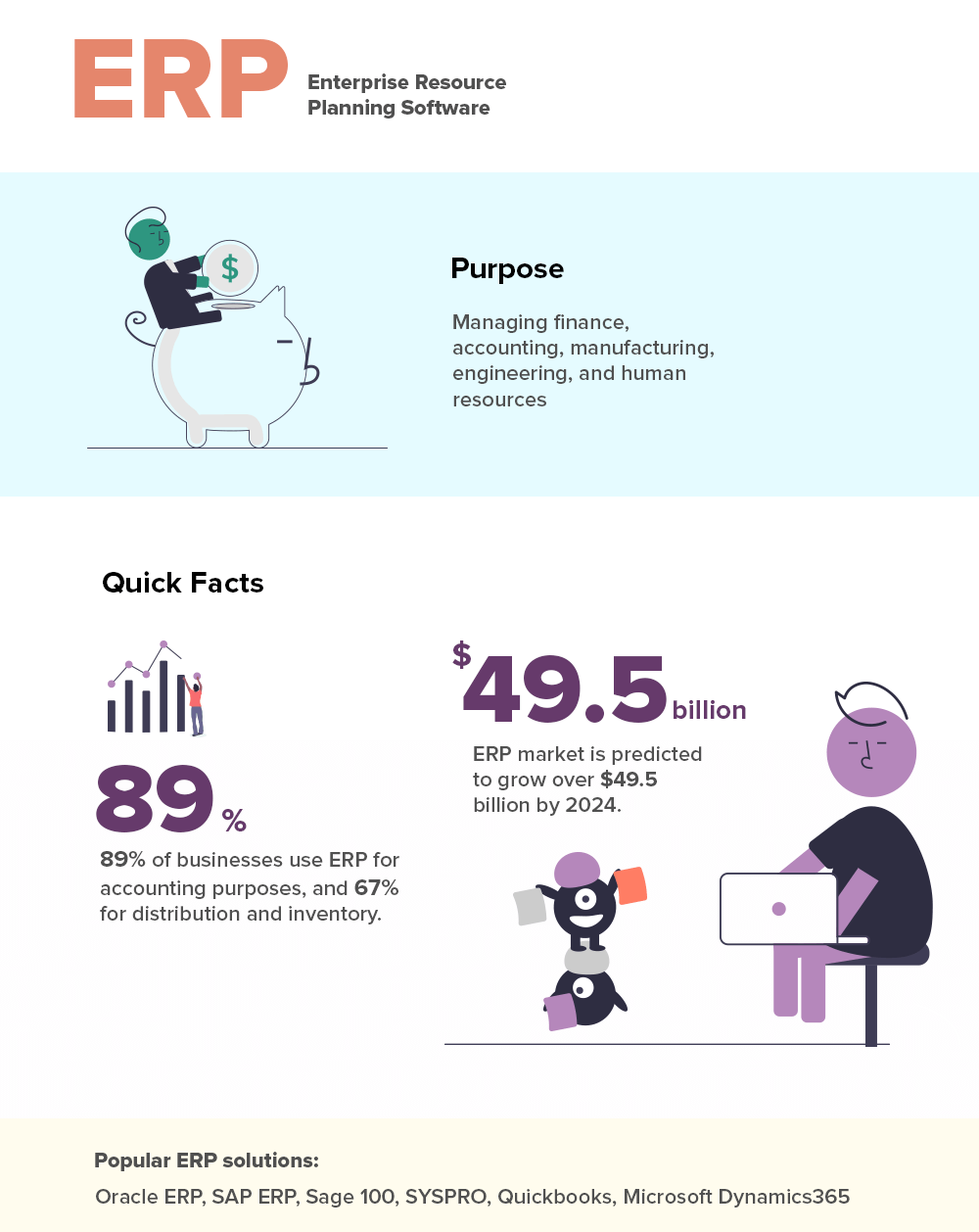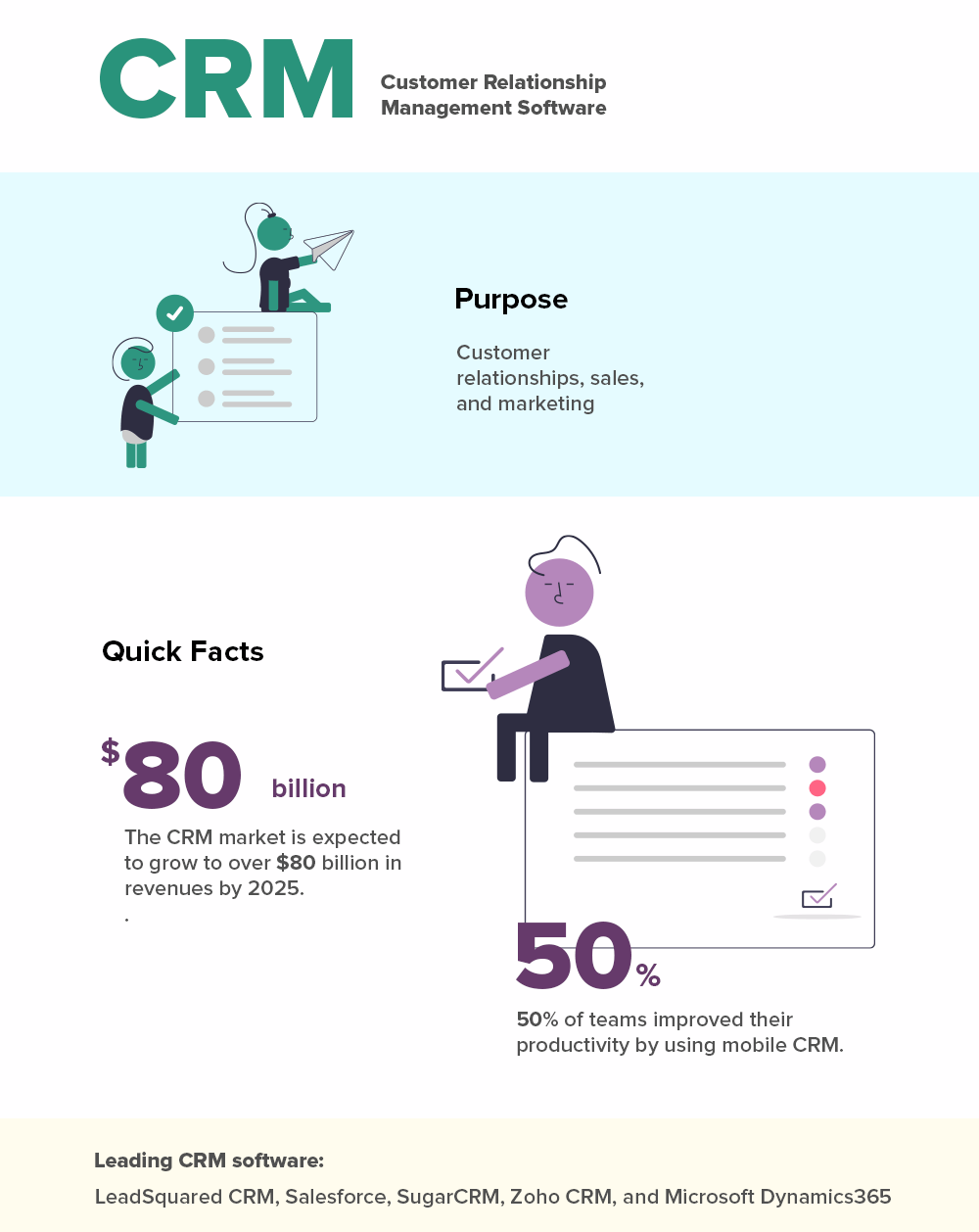
Your business needs critical technological tools and strategies for better results. With ERP and CRM integration, you can boost productivity, streamline processes, and drive profits. These systems have become a must-have for businesses. Still, most organizations purchase and use them independently.
But businesses have realized that ERP and CRM software offers more when unified.
Not sure what these benefits are? Today, I will share with you the main advantages of ERP and CRM integration and how they contribute to the success of your organization.
ERP vs CRM software
Businesses use CRM and ERP software to streamline their operations. Yet, both systems differ in their approach, focus, and expected results.
Enterprise resource planning (ERP) software enables organizations to manage day-to-day business activities, such as accounting, procurement, project management, risk management and compliance, and supply chain operations.
CRM (Customer Relationship Management) software allows organizations to define strategies, techniques, and tools for managing, retaining, and acquiring customers. CRM software streamlines all sales and marketing communications, keeps track of interactions with customers, and allows team members to reach out to customers (email, SMS, phone call) via the portal itself.
Also read – ERP vs CRM: What is Best for Your Business or Should You Use Both?
What is ERP software?

ERP software offers applications that automate and manage every day and back-end processes. The system typically stores shipping and billing information, purchasing history, and financial data. It may also store company inventory data and accounting information. In the end, ERP helps reduce manual labor, optimize, and centralize operations.
Ultimately, the information it tracks drives effective decision-making processes and streamlines operations. Top ERP examples include Oracle ERP Cloud, Biz Automation, SAP S/4 HANA, and Oracle Netsuite ERP.
Also, check out some fascinating ERP statistics!
What is CRM software?

CRM is a business software that helps you maintain good relationships with customers. It stores data about the customer, such as contact information and interaction history. This data can help nurture relationships and drive profitability and growth. In the end, CRM has two core goals:
- To provide a united face to the customer.
- To deliver a seamless customer experience.
Nonetheless, even as both ERP and CRM may store similar information. ERP software concerns back-end processes, while CRM focuses on the front-end.
Therefore, CRM helps the company track, automate, optimize, and analyze customer interactions. It unifies sales tracking, generating leads, pipeline management, marketing, and customer communication. Top CRM software examples include LeadSquared Sales Execution CRM, Zoho, Freshsales, HubSpot, and Microsoft Dynamics CRM.
In the following sections, we will talk about the advantages of CRM and ERP integration and how it works for the greater good.
Advantages of ERP and CRM integration
Together, ERP and CRM can bring tremendous potential to any business. Otherwise, your organization will have disjointed information silos, which is dangerous.
Experts say that incorrectly handled customer information increases the risk of dissatisfaction, and lost customer trust. Thus, you must unify the sale and purchase while building profitable customer relationships.
Statistics show that ERP systems drive a 23% increase in order-to-shipment times and 97% inventory accuracy. Still, CRM helps you create personalized interactions that foster loyalty and better marketing ROI. So, your business can offer a great experience with the CRM and ERP systems working together. Ultimately, it will drive customer retention and loyalty.
1. 360-degree view of customers
CRM and ERP integration offers a unified view of your customers. It is perhaps the biggest reason why you need it.
When you integrate ERP and CRM systems, you can enjoy a complete view of your customers. From accounting to finance, sales, and support, it offers total visibility and accuracy. It helps you gain better insights into your customer base. That way, you can efficiently track your customer-preferences, profitability, and loyalty. Also, you can identify cross-selling and upselling opportunities with existing customers. It will help you implement better strategies and determine future growth potential.
2. Consistent information
ERP and CRM systems store similar data on customer information. Therefore, ERP and CRM platforms often have duplicate customer data.
However, the problem occurs when both the systems work in silos. If you have two separate systems, then you will probably update the record in both platforms individually. Ideally, updating a record in ERP should reflect in CRM and vice versa. If it does not, then teams will have incorrect information about a customer and their purchase.
When your CRM and ERP platforms work together, duplicate data becomes a thing of the past. You can now look forward to real-time, up to date, and accurate stores of information. Your integrated platform can also help deal with inaccurate data. In turn, your business enjoys better data-driven processes and results.
3. Better employee collaboration
A connected and integrated workforce enjoys the benefits of higher productivity and efficiency. They can push for more results because everyone is on the same page.
Before now, each team had a different set of similar data. So, accessing the right information at any given time was almost impossible.
Your team can share and use up-to-the-minute information when ERP and CRM work together. It improves their chances of achieving better and more effective results.
Salesforce confirms that high performers prefer high collaboration across departments. The AON study also indicates that engaged teams can drive 17% higher productivity that can eventually result in 21% higher profitability and, ultimately, 10% higher customer ratings.
4. Increased mobility with ERP and CRM integration
Real-time data helps the sales and operations team deal with customer contracts efficiently. It helps them hasten contract approval processes and even achieve same day signing.
Thus, a centralized system will help shorten crucial process cycles. Cloud-based CRMs also make it easy to access information and update tasks from any location. It boosts faster time-to-revenue and maximizes business opportunities.
Also, watch the webinar to understand how to ensure mobility of workforce and business continuity.
5. Reduced training and IT overheads.
Statistics indicate that businesses spend 31.5 hours and at least $1,208 every year on training per employee. Having a single unified platform for both CRM and ERP can change that because you can easily teach employees to handle both systems at the same time.
Your employees will love the extensive training because it is much better than learning about one piece of software. They will also learn how to take critical actions. It instantly helps them see how it affects other operations and departments. What’s more, the cross-departmental approach keeps them more aware of your core business goals.
6. Improved efficiency
Siloed systems mean you might be stuck spending time on manual, arduous tasks. Integration makes it easier to automate workflows and manage processes.
That way, your teams can let go of manual, tedious tasks that chew up valuable time and resources. They can spend more time on crucial processes that impact your bottom line. They can also enter transactions, change, or update information at the touch of a button. Ultimately, the CRM/ERP integration saves your company time and money in labor costs. It reduces data redundancy, thereby making life easier for you and your teams.
7. Boost customer relationships
Real-time information helps your team interact with customers actively. It will also help you anticipate your customer needs and reduce support service time. In turn, your customers will enjoy a better experience.
The result is higher customer satisfaction, which drives repeat sales and customer retention. Over time, you can build communities of loyal customers saying good things about your brand. It translates to more visibility, more growth, and sustainable success.

8. Accurate predictions
A fully integrated system makes it easier to please your customers. For example, suppose a customer requests an order update through the service desk. What if your customer service rep must go through many systems to access that information? Some of which might be inaccurate. In that case, it results in a negative customer experience, which is a potential loss.
According to Dynamic Signal, over 52% of employees witness poor financial outcomes because of ineffective communication that results in lost sales and damaged company reputation.
With a fully integrated system, you can boost communication within and outside your company. You can also make better forecasts about the future. It can also help your CRM team deliver accurate quotes and marketing campaigns.
Your ERP team will also help you anticipate product demand. They will also make better predictions about shipping dates. Overall, you can make critical business decisions and mitigate business risks.
A few challenges along the way
ERP and CRM integration brings about remarkable results. However, there are some roadblocks your company may face when integrating your systems. The biggest revolves around standardizing your data across all your processes. Therefore, you must make sure that each system can accept the data connected and enhanced. Such events require data transformation in a variety of formats. Another key roadblock is figuring out how many touchpoints need integration.
Also, you may have to clean up old and outdated customer data. You cannot understand your business position if your system stores lost customers’ data as actual customers.
Concluding thoughts
ERP and CRM integration can drive business efficiency and grow your customer base. Still, your business is unique and different. So, you might need some customization.
To enjoy the benefits of CRM and ERP integration, pay attention to the necessary details. Assess your systems, clean up your data, figure out how you will integrate. In the end, you can discover the right integration that supports your needs now and in the future.
Are you looking for a CRM that drives high-velocity sales and integrates with ERP, telephony, and several other useful systems? Try LeadSquared CRM for free!
Also read:
- CRM vs ERP for higher education
- How to improve B2C sales?
- 11 Best ways to generate B2C sales-ready leads
- Campaign management in marketing: things they don’t tell you!
- Innovative ideas for enterprise marketing in 2021
ERP and CRM integration FAQs
ERP software corresponds to a software system for Enterprise Resource Planning. It allows storing and sharing information in a standardized format across teams and other integrated software systems.
CRM or Customer Relationship Management software is the best solution for managing a company’s interactions with existing and potential customers.
With an integrated ERP and CRM system, both sales and manufacturers/retailers can enter transactions (product or sales orders) or change customer records. It allows all the teams to have the actual and updated information every time.
CRM integration refers to the capabilities of the CRM software to integrate with other software systems, such as telephony, email, chat, social media, and other software tools. Details.
ERP integration refers to the capabilities of the ERP software to integrate with other software systems that a company might be using. For example, it may connect with CRM software, billing, payroll software, etc.






